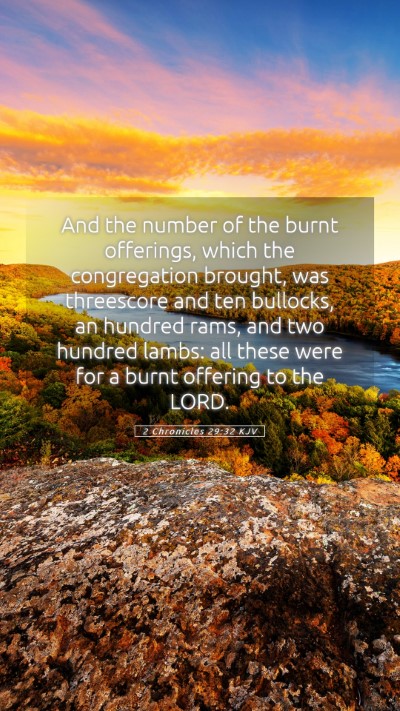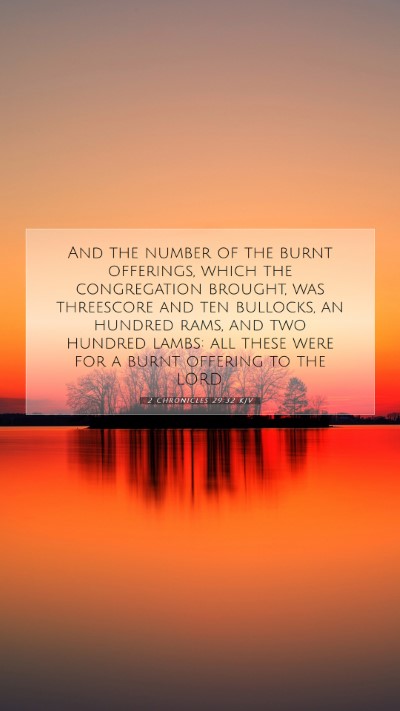Understanding 2 Chronicles 29:32: Commentary and Insights
Bible Verse: 2 Chronicles 29:32
Verse: "The congregation brought in sacrifices and thank offerings; and as many as were of a free heart burnt offerings."
Introduction to the Verse Meaning
This verse captures a moment of corporate worship in ancient Israel, highlighting the people's response to God's grace and the restoration of temple worship under King Hezekiah. In this analysis, we will draw upon insights from public domain commentaries to deepen our understanding of this passage.
Exegesis and Contextual Analysis
Historical Context: The chapter situates itself in the reign of King Hezekiah, who undertook significant reforms to revive temple worship after years of neglect. His actions are a response to the previous kings' decisions, which led to idolatry and disobedience against God.
- Matthew Henry emphasizes the importance of the people's willingness to offer freewill sacrifices as a sign of their revived spirituality. This voluntary act reflects their gratitude and devotion to God.
- Albert Barnes notes that the sacrifices mentioned are not mere routine; they represent genuine thanksgiving to God for His mercy and the restoration of the temple. Such offerings were essential in maintaining the covenantal relationship with God.
- Adam Clarke points out that these offerings were essential not only for atonement but also for communal unity, indicating how worship fosters a sense of belonging among the faithful.
Spiritual Significance of the Offerings
The sacrifices brought by the congregation signify much more than a traditional ritual. Here are key insights:
- Acts of Worship: The act of bringing offerings represents the people's commitment to worship and seek God's favor, which is an important theme throughout the Scriptures.
- Symbolism of Sacrifice: In the ancient context, sacrifices were a way to express gratitude and seek reconciliation with God, offering a foreshadowing of the ultimate sacrifice in Christ.
- Collective Worship: The unity in offering emphasizes the corporate nature of faith; believers are called to come together in worship, strengthening the community of faith.
Application of the Verse in Modern Context
This verse holds significant implications for modern believers:
- Freewill Offerings: Today, the concept of freewill offerings extends beyond material gifts to include acts of service, time, and dedication to God's work.
- Worship in Spirit: This reminds believers to approach worship with a heart full of thanksgiving and sincerity, reflecting Hezekiah’s revival spirit.
- Community of Faith: It encourages today’s congregations to foster an environment where collective worship strengthens bonds and encourages mutual edification.
Conclusion: Embracing the Call to Worship
2 Chronicles 29:32 serves as a powerful reminder of the importance of worship in expressing gratitude and devotion. As believers today, we are called to reflect on our practices of thanksgiving and our collective worship experiences. By understanding Scripture deeply, we can apply these lessons to our daily lives and contribute to the community of faith.
Related Bible Cross References
- 1 Chronicles 29:9 - The joy of the people bringing offerings willingly.
- Hebrews 13:15 - The call to continually offer God a sacrifice of praise.
- Romans 12:1 - The idea of presenting ourselves as living sacrifices.


